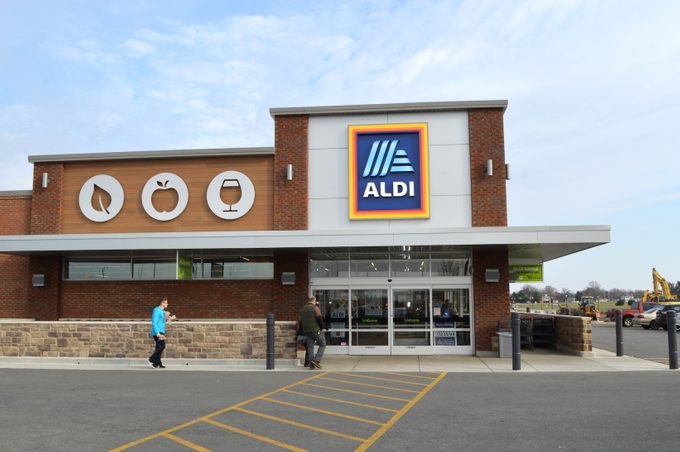We know about Aldi's no-fuss attitude, but what about the lack of tunes?

The Real Reason Why Aldi Doesn’t Play Music

Aldi isn’t like other grocery stores. Although they do naturally sell tons of different foods, the German-founded chain is memorable for going against the grocery status quo in other ways. Aldi doesn’t provide free bags or carts for your groceries, for example—but then they do offer really great prices on everything from wine to bread to chocolate.
One notable thing Aldi doesn’t do is play music, as grocery stores so often do. Yacht rock, anyone? So why doesn’t Aldi play music? To get the answer to this grocery store mystery, we checked in with consumer behavior analyst Jenna Coleman; John Stranger, a VP at a food-based creative agency; and shopping expert Kristin McGrath.
Read on to find out just why Aldi aisles are full of deals—and not so much noise.
Get Reader’s Digest’s Read Up newsletter for more shopping tips, humor, cleaning, travel, tech and fun facts all week long.
Why doesn’t Aldi play music?

The chain first came to the United States in 1976, and there are now some 2,400 Aldi stores across 38 states. One thing you won’t find in these stores is music. The lack of tunes is part of Aldi’s strategy for keeping prices low. “As someone who shops at Aldi every week, I am very familiar with the many things Aldi does to cut costs,” says Coleman. “Not playing music in their stores is just another line item they aren’t passing on to their customers.”
How could not playing music cut costs? According to Stranger, Aldi avoids paying licensing fees by not playing music at all. Playing music usually means paying a third-party licensed music service. Research suggests that hearing calming music in stores makes customers relax and browse more, which is why many stores play music. But relaxation isn’t the most important thing to Aldi customers—savings are. People are there to save as much money as possible, which means a loyal fan-base happy to pay 25 cents to use shopping carts.
Not playing music also adds to Aldi’s efficiency. The store setup gets customers in and out. That’s why there’s a cart self-return policy, consistent layouts, no-nonsense shelf displays and prepackaged produce that you don’t need to weigh. “Music that encourages relaxed wandering and browsing is not part of that master plan,” according to McGrath.
If the lack of music means paying less for groceries—and spending less time shopping for them—then that sounds like good news for Aldi and Aldi customers alike.
About the experts
|
Why trust us
At Reader’s Digest, we’re committed to producing high-quality content by writers with expertise and experience in their field in consultation with relevant, qualified experts. We rely on reputable primary sources, including government and professional organizations and academic institutions as well as our writers’ personal experiences where appropriate. We verify all facts and data, back them with credible sourcing and revisit them over time to ensure they remain accurate and up to date. Read more about our team, our contributors and our editorial policies.
Sources:
- Aldi Corporate: ALDI History
- Jenna Coleman, consumer behavior analyst in the grocery sector and founder of Particular Pantry
- John Stranger, VP group supervisor of food-based creative agency EvansHardy+Young
- Kristin McGrath, savings and deals expert at Offers.com























